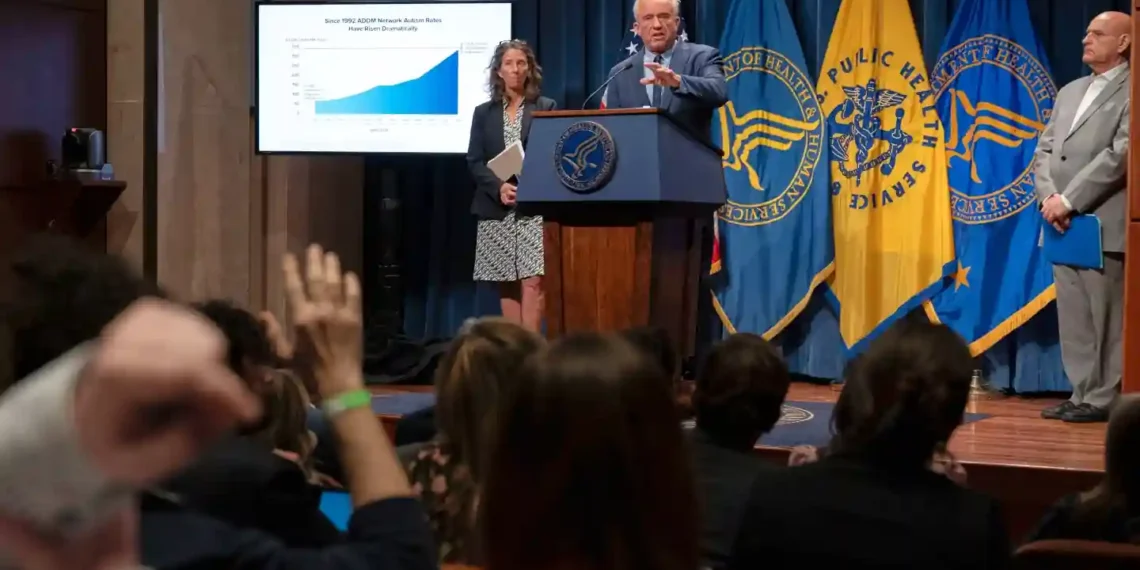Health Secretary Robert F. Kennedy Jr. Raises Alarm Over Rising U.S. Autism Rates, Promises Research into Environmental Causes
Health Secretary Robert F. Kennedy Jr. is sounding the alarm over the increasing number of U.S. children diagnosed with autism, calling the rise an “alarming” trend. On Wednesday, Kennedy pledged to spearhead comprehensive studies aimed at identifying any environmental factors that might contribute to the growing prevalence of the developmental disorder.
This statement comes just one day after the Centers for Disease Control and Prevention (CDC) released a report revealing that approximately 1 in 31 children in the U.S. have been diagnosed with autism—up from 1 in 36 in 2020. The spike in autism diagnoses has raised questions about potential causes, leading Kennedy to emphasize the need for further investigation.
Kennedy described autism as a “preventable disease,” despite it not being classified as a disease but a complex disorder that affects brain development. “Autism destroys families,” Kennedy stated. “More importantly, it destroys our greatest resource, which is our children. These are children who should not be suffering like this.”
While Kennedy’s focus is on understanding the environmental factors that may contribute to autism, experts in the field suggest the rising numbers may also reflect changes in how the condition is diagnosed. Over time, the definition of autism has expanded to include cases that are milder, contributing to a higher number of diagnoses.
Autism, a developmental disorder, manifests in a wide range of symptoms, including delays in language, learning, and social skills. Some individuals may not show symptoms until adulthood. While no single cause has been identified, researchers believe genetics play a significant role. In addition, factors such as a child’s father’s age, maternal weight, and prenatal exposure to certain chemicals have been linked to autism risk.
Kennedy’s approach will investigate these and other potential environmental factors. Although he had initially set a September deadline to determine autism’s causes, he now believes that his department will provide at least partial answers by that time.
Kennedy’s plan includes issuing grants to universities and researchers, encouraging them to “follow the science, no matter what it says.” This initiative follows a history of cuts to science and health research funding under the Trump administration, which had previously slashed billions of dollars in grants to universities.
To conduct this research, the CDC gathered autism data from 14 states and Puerto Rico in 2022, focusing on 8-year-olds as most autism diagnoses occur by this age. The CDC’s most recent estimate of 1 in 31 children diagnosed with autism is considered the gold standard by many experts due to its rigorous methodology.
Despite Kennedy’s focus on environmental factors, other researchers argue that the increase in autism diagnoses can be attributed to improved awareness and medical advancements. Annette Estes, director of the autism center at the University of Washington, explained, “The reasons for increases in autism diagnosis come down to scientific and health care progress. It’s hard for many people to understand this because the causes of autism are complex.”
The Autism Science Foundation, in response to Kennedy’s comments, emphasized that factors like better access to services and reduced stigma surrounding autism spectrum disorders are key contributors to the rise in autism prevalence. Dr. Alycia Halladay, the foundation’s Chief Science Officer, noted, “This report is the most convincing evidence yet that changes in factors like access to services and de-stigmatization of autism spectrum disorders are leading to the increases in prevalence.”
As the debate over autism’s causes continues, Kennedy’s initiative promises to shed light on this complex issue, offering a deeper understanding of the environmental factors that may be contributing to the increasing number of diagnoses.
This article was rewritten by JournosNews.com based on verified reporting from trusted sources. The content has been independently reviewed, fact-checked, and edited for accuracy, neutrality, tone, and global readability in accordance with Google News and AdSense standards.
All opinions, quotes, or statements from contributors, experts, or sourced organizations do not necessarily reflect the views of JournosNews.com. JournosNews.com maintains full editorial independence from any external funders, sponsors, or organizations.
Stay informed with JournosNews.com — your trusted source for verified global reporting and in-depth analysis. Follow us on Google News, BlueSky, and X for real-time updates.














